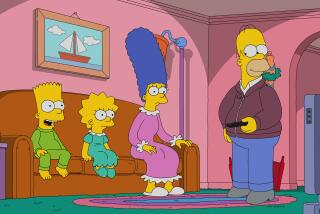Matt Groening’s ‘Futurama’ is ready for its intergalactic send-off
“Futurama,” the other cartoon series created by Matt Groening, is nearing the end. Now in its final 13-episode half-season, it was born on Fox in 1999, canceled in 2003 and revived from its state of suspended animation by Comedy Central in 2008.
Given that it has come to this point once already, and given that cartoon characters look just as good, or just as bad, after even a long hiatus as they did before, something about this finale seems less than final. “There is a last even of last times,” wrote Samuel Beckett; perhaps this is only the next-to-the-last of last times.
“We’re resting on our laurels and getting ready for a Comicon ‘perhaps farewell,’” Groening told me recently. “We always say, ‘Futurama’ lives, and so far we haven’t been lying.”
PHOTOS: Memorable TV series finales
We were in a Oaxacan restaurant, where some months before we had met to discuss “The Simpsons,” his previous cartoon series, then reaching its 500th episode. (I should point out that I have known Groening since the early-late 20th century, in light of which you are free to regard everything I write here as biased.) Like Philip J. Fry, his “Futurama” protagonist, Groening himself is living in the future, production on the series having already wrapped.
Though “The Simpsons” is a global brand and cultural landmark where the less-watched “Futurama” is simply a cartoon, I wouldn’t care to say which of the series is the better one. There are visual similarities, of course, both shows being predicated upon Groening’s own drawing style, which favors goggle-eyes and overbites, and similar rhythms to the jokes and asides and cutaways. But they are different beasts, and given the choice at any moment between watching one or the other, I’d be more liable to choose “Futurama.”
Where “The Simpsons” exists out of time and has moved past or above narrative consistency to stand for whatever the moment demands, the characters of “Futurama” stand only for themselves, in more or less real time; they have hopes and feelings and intertwined fates, and you care what happens to them. And where “The Simpsons” took a shotgun to the sitcom family ideal, “Futurama” is about community and teamwork and an intergalactic multiculturalism — in which respect it also resembles, say, “Star Trek.” It’s about the family you make rather than the family you’re stuck with.
Groening put it this way: “I always say that ‘Futurama’ is real, and ‘The Simpsons’ is fiction.”
VIDEO | Round Table: The future of animation
It began as the story of Fry (voiced by Billy West), a dimwitted, good-hearted 20th-century pizza boy who falls into a cryogenic pod on the eve of the 21st century and awakens at the start of the 30th; he winds up working for an interplanetary delivery service run by his distant nephew, a cranky mad-scientist type (West); co-workers include an extraterrestrial lobsteresque physician (West, again); a Chinese intern raised on Mars (Lauren Tom); a Jamaican accountant (Phil LaMarr); a reprobate robot, Bender (John DiMaggio), who becomes his roommate; and Leela (Katey Sagal), the cyclops pilot he loves.
“I learned that the animators could draw women in the ‘Simpsons’ style who looked beautiful,” Groening said, “which was a great surprise to me! So I wanted to see if I could create a science-fiction heroine — except I wanted to mess with the fanboys, so I gave her one eye.”
Of Fry, he said, “We thought we had to have a representative from our time to explain things to the audience; it turned out that was not necessary at all. I do like the construct. H.G. Wells has a story called ‘When the Sleeper Awakes,’ and it got used over and over again, memorably by Woody Allen in ‘Sleeper.’ So we didn’t rip off ‘Sleeper,’ we ripped off H.G. Wells. Just for the record.
“I loved literary science fiction. In fact, as a kid, when I was reading science fiction, I thought ‘I can’t wait for the future when the special effects are good’ to represent what was in these books by Arthur C. Clarke, Alfred Bester, Philip K. Dick, J.G. Ballard, Jack Vance.”
PHOTOS: Celebrities by The Times
Groening developed the series with show runner David X. Cohen, who had been a writer on “The Simpsons” and had “a great deal of enthusiasm for science fiction; he would go on about Stanislaw Lem and Olaf Stapledon. He and I talked about ‘Futurama’ for two years before we pitched it. So when we finally sat down with Fox and told them the idea for the show, we exhausted them; they picked it up in that meeting. But it was partly because we could answer all their questions. We knew things we wouldn’t be introducing until Season 5.
“And from then on, it was a battle, because they thought it was going to be bland and peppy like ‘The Jetsons.’ ‘The Simpsons’ in the future, that’s what they thought they were going to get. But I didn’t want to be accused of ripping myself off. We wanted to do a workplace comedy. ‘The Simpsons’ was about children and married parents; ‘Futurama’ is about people in between, they’re growing up and haven’t settled down. Every other cartoon show seemed to be, you know, dumb dad, bratty kids.
“We set ourselves the double challenge that we wanted to be funny first, but we also wanted to have interesting science-fiction ideas. With a writing staff as over-educated as ours, it led us down some really strange ... tunnels. They would debate abstract mathematics for long periods of time.” In one episode, characters switched brains but “had to switch to another character before they could get back to their own brain, and Ken Keeler, one of the original writers on ‘The Simpsons,’ wrote a complicated theorem to show the minimum amount of moves it would take to get back your own brain.”
Inevitably, there is a movement to keep the show alive. An online Save Futurama — Again petition has more than 23,000 signatures, from all over the world.
PHOTOS: Memorable TV series finales
“Oh man, I damn like ‘Futurama’ so much!” wrote petitioner Dmitrii Shetnikov from Russia. “This is the cartoon of my childhood, guys, please do not close the show!” Faisal Sawalmah, United Arab Emirates, agreed: “‘Futurama’ is one of the greatest shows alive. If crap like ‘The Cleveland Show’ can survive, then ‘Futurama’ deserves a shot!”
Groening is more sanguine. “We certainly feel creatively fulfilled. In the past, we felt like we were canceled before our time, but this time we feel like we had a really good run, and this is a great last season and builds to a great final episode, which I’m very proud of. David Cohen describes it as a very romantic war-fest, and he’s absolutely right. You see all of your favorite characters die, and some of your favorite characters find love. And as alarming as that might sound, it’s very sweet.”
Die?
“Well, when I say ‘die’ — there is such a thing as time travel, you know.”
PHOTOS, VIDEOS & MORE:
Real places, fake characters: TV’s bars and eateries
CRITICS’ PICKS: What to watch, where to go, what to eat
PHOTOS: Violence in TV shows
More to Read
The complete guide to home viewing
Get Screen Gab for everything about the TV shows and streaming movies everyone’s talking about.
You may occasionally receive promotional content from the Los Angeles Times.







